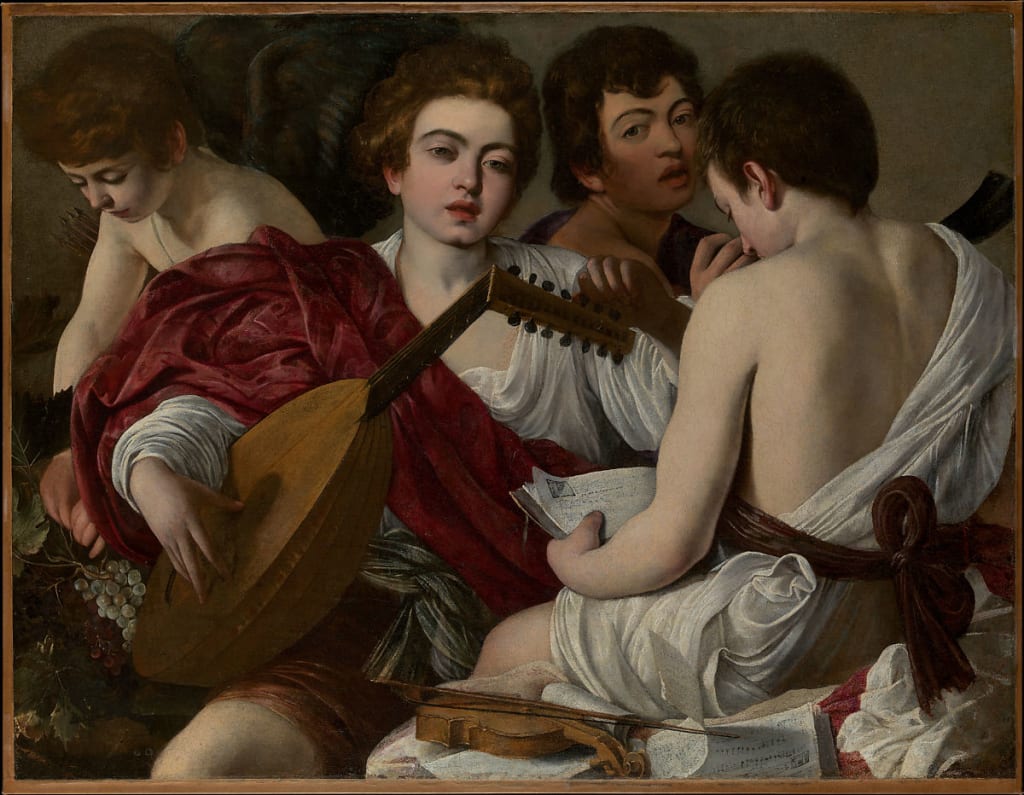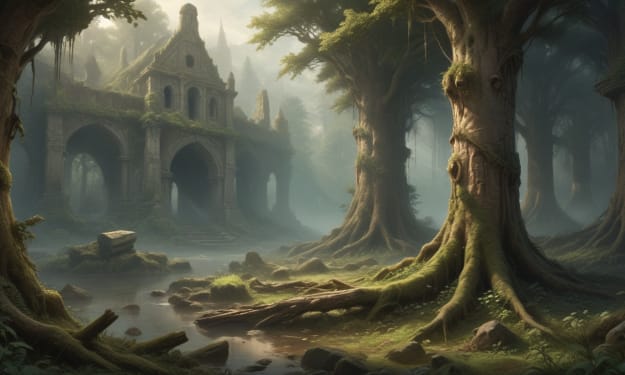The Hunchback's Apocalypse
a dystopia from the past

Sometimes it isn’t enough to take a punch in the solar plexus – sometimes you’ve gotta be grateful for it.
Rigo had dark inky eyes under a jutting brow, an old lute with a hairline crack on the soundboard, a blood-stained doublet, two dead parents and the sort of tenor you’d expect to hear in a heavenly choir. And right at this moment, he had three brawlers from the nearby taverna taking it in turns to sit on his hump. They were burying his head deep in the mud, but not deep enough to be spared their jokes:
‘You ever ridden a camel? The hump’s for storing water, so if we get thirsty we can crack it open!’
The rustle of sails behind them, the squeaking of the windlasses used by the stevedores to pull down the crates, the jeering of the seagulls – these were background to the brawlers’ jibes. Just let them do what they gotta do, it can’t last forever. He tried to hum a melody from the song he’d been composing when they clocked him (minding his own business, sitting on an oak-slatted crate looking at the sea):
‘The waves that lap my lady’s tower,
They tell me I can’t swim to her,
But now that it’s the witching hour,
These arms against those waters stir...’
They were cursing louder, pressing harder on his back, voices so loud surely somebody would pull them away, or at the very least warn them to keep it down. So many voices, it was a wonder they hadn’t crushed him, that his spine hadn’t snapped. Not just three voices, it sounded like – ooh, less pressure on his back at least, was there only one of them now? - it sounded like dozens were screaming, or hundreds. When he brushed off the last weight, which was nothing but an oaken barrel stave, he could see stumbling legs and fallen bodies, men crawling in the mud nearby… And in their dilated eyes, in every eye, he saw the white bulge of shock.
By the time he picked himself upright, the brawlers were only a few yards away, kneeling in the mud. One of them was rubbing his eyes, as if to pick out some grit; another was slapping his face, like he knew he’d had too much to drink and needed to sober up; another was shaking his head, arse-deep in the filth.
‘Please,’ he called out, ‘please… help… me!’
But nobody paid any attention. With their arms stretched out, they were groping around the dock, collapsing against barrels, fending off the crashing gulls, falling over in tumbled heaps and slipping off the edges of wharves, the water gurgling triumphantly as they screamed from the wrong side of the pilings.
The huge shadow overhead made the world dark, but for Rigo at least, it wasn’t as dark as for others. It looked like the biggest ship he’d ever seen – a giant’s galleon with more than a hundred decks – a tower of Babel less than a league from the harbour. It had landed in the sea, so he could only compare it to a ship: but a ship made of metal – as if some divine amnesty had gathered all the plate-armour in the world. By the time Rigo looked at it, the huge lights had been snuffed out by the sea itself. Most had paid the price of that unworldly vision. The lucky ones lent them a helping hand and helped themselves to their plumed hats and purses. Rigo picked up his lute, which was lying in two pieces behind a barrel of flounder. Under the circumstances, an unplayable lute wasn’t much to complain about. If the chaos around him was anything to go by, he’d soon have his hands on a new one.
*
When the world’s lost its sight, it’s hard to keep up appearances. Stubble bristled on men’s cheeks and their beards grew unruly, they wandered about half-dressed, in torn doublets, with threads and buttons missing; women’s cheeks were stained no longer by ground angelica but the tracks of their tears. Less than one in ten, so they said, had the use of their eyes. You could pick them out by the cut of their clothes, the shine of their boots, the long trains of their dresses and the barding on their horses; not to mention the awkwardness with which they wore their new quilted jackets and cloth armour.
Beggars and thieves they might have been yesterday, but today they were barons and duchesses, with castles and fiefs. It wasn’t likely to last – there was nobody on the farms, the ships were bobbing impatiently at the wharves, their cargo holds hollowed out in frantic disorder. In the markets, stalls had been torn down for plunder, the taverns were stacked with bodies and the leaked ale mingled with blood; and if you stood long enough, you could hear the cries of blind women begging for forbearance. In one of those puddles, Rigo observed himself – his eyes gleaming brown as chestnuts, his hair slicked back with oil, his big chest strapped in a red and yellow doublet he’d loosened from the corpse of a jongleur, whose lute – with fine strings of sheep-gut and a rosewood soundboard – he cradled in his arms. Shucking off his old self like a snake’s skin, he marched among the stumbling masses, climbing on top of barrels and standing on trestle tables in the squares:
‘I sing,’ he announced from one such podium, ‘a song of consolation.’
The crowd shuffled around him, grasping for the bubbles of sight that drifted with the sinuous harmony of the strings. He asked for no coins, since there was nothing he couldn’t get with his own hands. He sang for the pleasure of it, for their pleasure and his own.
Not everything had turned upside down. On a grassy hill above the port, a baron lived in the villa his great-great-great grandfather had claimed after an honourable military triumph over a plague-ridden village seven leagues away (or so the bards had sung). The baron had been looking out from his balcony when the miracle occurred; but he had loyal servants who’d spent their lives staring at the marble flooring their elbow-grease had given so much shine. They kept the baron fed and clean, and only expressed their lives’ frustrations with trivial mischief-making, such as tearing down the antlers above the dining hall doorway to wear on their heads while they served him tender rabbit’s breast stewed in fermented grape sauce, brown truffles and Malvasia wine, or pulling down their breeches and asking if he’d like any cream.
Song was the baron’s love, and Rigo climbed the one-hundred-and-twenty-nine steps that clawed the hill to bring him melodies, pulling the baron to the edge of his chair with his syncopated rhythms, the shifting moods of the strings, the notes drawn out of his chest like a conjurer’s surprise. He sang of lovers riding across meadows and into each other’s arms, imprisoned in towers, embracing on ships, tending to each others’ wounds at the end of a battle.
‘Bravo!’ exclaimed the baron, drumming his platter with a rabbit’s thigh-bone, for he was a romantic sort. As Rigo set down his lute, a servant, naked except for the gauntlet he was wearing as a cod-piece, approached him with a silver bowl and invited him to pick out his reward. He chose a ruby cabochon the size of a turtle’s head, and gazed in wonder at this treasure as they brought him a bowl of freshly warmed stew.
The baron’s villa was the place to go if you wanted a decent meal or peace. His larder had all the best preservatives and his servants had rifles and swords, not to mention the villa’s eminence on its grassy hill. But in the lower town, matters were more complicated. Men from the mines, disproportionately spared the blindness elsewhere, had formed gangs and were redistributing the wealth of the streets. In the midst of all the dagger fights, it was the flies, rather than the able-sighted, that appeared to be enjoying the greatest profit.
Rigo may not be brave, but nor was he indifferent to the sight of inert children’s bodies or infants crawling in muck. Everywhere he went, people listened to his songs, whether the miserable folk of the alleys or the baron on the hill. Maybe it would be the same across the sea. He could feel it calling him, dragging him its way, like a chunk of rock in a comet’s tail.
Easy enough to find a boat, to fit the oars in the rowlocks and stir the waters. There was drizzle over the sea that day, so the metal behemoth was lost in the clouds and the salty chill of the water, a ghost of the green hill where the baron lived. As the water sucked at the oars, Rigo could see the gleam of squares of material that resembled stained glass, a dark, cusped opening lower down and a long metal ramp tonguing the sea. He tied the bow-rope to a leg of the ramp and the doorway irised shut behind him, like the sudden drop of a portcullis.
‘I sing a song of consolation,
Hoping to uplift
All men and women, soothe frustration
With this song, my gift...’
The strings rippled under his fingers, the whirling variations of shifting moods bridged by vibrato, his tenor echoing against the metal walls. The eyes of his audience were cyan-blue and crimson-red, like garnets and shards of lapis in a cave. The hissing, chittering sound reminded him of cicadas in the middle of summer; it was the sound of many different sensibilities in conference. He did not know if they would let him return, if they would take away his sight as they had taken so many others’, if they would eat him. He knew only that they were gods, or close enough to render the difference irrelevant.
Their forms were hard to distinguish. Only the one that escorted him back to his boat installed itself in his mind with any clarity: a carapace of iridescent blue, like the abdomen of a dragonfly, eyes gleaming bright as gems. The creature held his hand between chitinous talons, and placed something cold in his palm. He felt some probing organ run along his hair, he felt the hair crozzle, he felt the searing pain of heat. A singed line dissected his head, like a new form of tonsure. Painful as it was, at least he didn’t have to listen to any jibes.
Only when he was a few spans from shore did he rest the oars in the locks and look at his reward: a silver metallic capsule, roughly the shape of a heart. A ball clasp snapped open, and in a gaseous swirl, a vision emerged, as if it was being plucked from the bare skin at the top of his skull: a wagon loaded with vegetables, a market stall bursting with wares, customers forming a queue outside a baker’s oven, crates dropping from a stevedores’ winch. Boots in the backs of his knees, his mouth crashing against the mud, brawlers taking it in turns to sit on his hump...
The clasp-pin snapped in place, and he hung the locket around his neck with a piece of rope-twine in the bail. There was time enough to bring back the world. But first he would call at the baron’s, for another bowl of stew and another of those enormous jewels; and maybe he’d shift around for another pair of buskins, a hat with a plume, a better doublet... He had all the time in the world, did he not? And whoever said the world had to be restored today? Tomorrow would come soon enough…






Comments
There are no comments for this story
Be the first to respond and start the conversation.